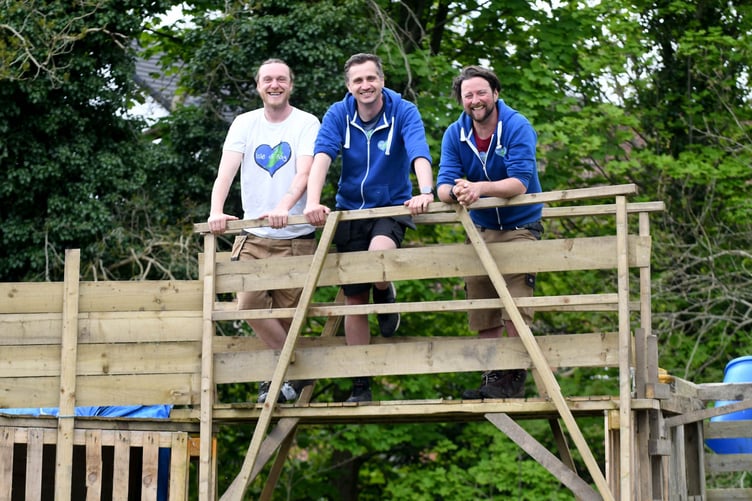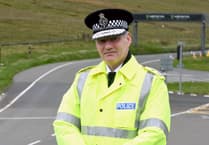The best thing you can give a kid to play with is another kid. You don’t need expensive stuff, you just need kids,’ says Chris Gregory.
Chris is the founder of Isle of Play and we’re standing in the middle of the charity’s Lester’s Yard Adventure Playground in Braddan.
Right now they are running a session for children who have been referred to the charity because of behavioural or mental health issues.
Later this evening it will be thrown open to kids from the surrounding areas to just come and enjoy themselves.
What is clear is that this is no ordinary playground. None of the standard rubber safety matting and identikit swing/slide/roundabout combinations, provided with good intentions but little imagination.
This is very different. It’s full of rickety-looking structures mostly made of pallets and accessed by rough hewn wooden ladders. These surround an enormous sandpit with an old rowing boat beached in the centre and hose pipes at the ready to turn the whole thing to a sea of sandy mud.
Quite clearly, it is child heaven. An open invitation for them to use their imaginations and turn it into any landscape or adventure they might choose.
And it’s exactly what you’d expect from Isle of Play.
They got themselves noticed at their first appearance, four years ago, at the Royal Manx Show when they brought along hammers and nails – yes, real ones – for the children to let rip on their own versions of construction.
It’s fair to say the island had never seen anything like it before. Organisers had made sure the St John Ambulance was nearby.
Chris says: ‘I remember the look of horror from a few people. But it was great.
‘We were right next to a bouncy castle and the bouncy castle didn’t have anyone on it the whole day whilst we were just inundated.
‘When you give the kids permission to play, that’s when the really great stuff happens.’
He goes on: ‘That’s the way we look at it, that we give them permission to play: that’s the key attribute to it all.
‘We hear lines like “children today just don’t know how to play” and that’s not true – it’s not possible. They might not play the way you would like them to play but you can’t just undo two million years’ worth of evolution in the space of a 10 year old’s life.’
And play is a serious business. Recognition of the role of play in a child’s development has been growing over the last several decades with many universities now offering courses on the subject: Swansea, for example, offers a Masters in Developmental and Therapeutic Play.
Isle of Play advocates for children’s Right to Play (as in Article 31, United Nations Convention on the Rights of the Child). It provides vital opportunities for a child to let their imagination run wild and learn to manage risk.
Chris says: ‘When a two or three year old visits this place they’ll be doing things their parents never thought they were capable of doing.
‘The evidence seems to suggest that even a four year can manage risk as well as an adult, once they’ve experienced it and I think that’s the key.
‘How are you ever going to navigate the world that you’re in unless you’ve got the experience to of actually being in it? And that’s what play does, it gives children the opportunity to experience the world around them, on their own terms and at their own level, and that’s how we’re hard wired, typically, to learn – it doesn’t have to be spoonfed to them.
‘This notion that we have to tell children how to act and behave, how to manage risk, is a complete fallacy.’
The pandemic has brought the subject of play very much to the fore, providing stark evidence of what happens when children can’t play, and can’t socialise. Chris and his team took part in research Swansea University was carrying out during lockdown, looking at the play behaviour experiences of children and what could be done in future pandemics.
Chris says: ‘We’re seeing it now: as a result of all that time that children spent locked up inside and not being with their friends, CAMHS (Child and Adolescent Mental Health Services) in the island have got one in 10 children lining up to be seen by their services and we’re getting referral, after referral, after referral for one-to-one support here for kids who can’t manage within a school day.
‘Our workload is tenfold now compared to what it was. And we won’t know the full extent of the damage perhaps for another 10 or 20 years.’
Something else that concerns Chris is the way children are rarely seen playing in the streets these days.
He says: ‘I can see more than 1,000 houses around the area in Peel where I live and very few children playing out in the streets there. And yet the roads are incredibly quiet.
‘In the space of four generations, the average roaming area for an eight year old, on their own without an adult, has gone from 6-8 miles to the majority of children not being allowed past the threshold of their own property.’
Isle of Play have recently worked with Hartford Homes on their new development in Jurby where they have sought to address this issue.
Chris recalls: ‘One thing that we seem to have lost and that we were keen to do with Hartford was to bring the children back to the streets around where they live.
‘We were looking at the spaces with them [on the new development] and instead of us just opening up a catalogue, picking a set of swings and a basic little climbing frame that cost £40,000 or whatever, we decided to make this playground run throughout the whole estate.
‘So by careful development and landscaping of the ground around the estate you can include mounds, trees, natural features like boulders and rocks, to create an environment that’s much more engaging to children than simply a standard playground.’
He adds: ‘There’s a mixed message that parents are receiving, that they have to keep their children safe.
‘That is not the job of a parent: the job of a parent is to make their children competent and the only way is by allowing them to experience the world on their own terms, and the only way children can experience the world on their own terms is through play.
‘The science is telling us that play is how children develop the resilience to develop positive mental health to protect them as they grow older.
‘It’s no coincidence that the decline in children’s play has coincided with deteriorating levels of mental health and increased levels of childhood obesity. Play is directly linked to positive physical, emotional and mental health and we want every child on the Isle of Man to be able to access great play opportunities on their doorstep.’
I ask Chris what it’s like to have a job where he ‘plays all day’. But, as he points out, play is an important component in our adult lives too.
He says: ‘The way we think of play is that we consider it to be a very childish pursuit and yet we’re sitting here and we’re joking and we’re laughing and that’s a form of play. Brian Sutton-Smith, the American developmental psychologist, said that the opposite of play is not work, the opposite of play is depression.
‘So, if you’re doing a job and you’re not enjoying yourself whatsoever, then the chances are you’re not playing within it. You need to find the play in the work that you’re doing. So do we play here? Yes, we do play here, but so should everybody else in the workplace as well.’
It’s a good message for us all.

.jpeg?width=209&height=140&crop=209:145,smart&quality=75)



Comments
This article has no comments yet. Be the first to leave a comment.